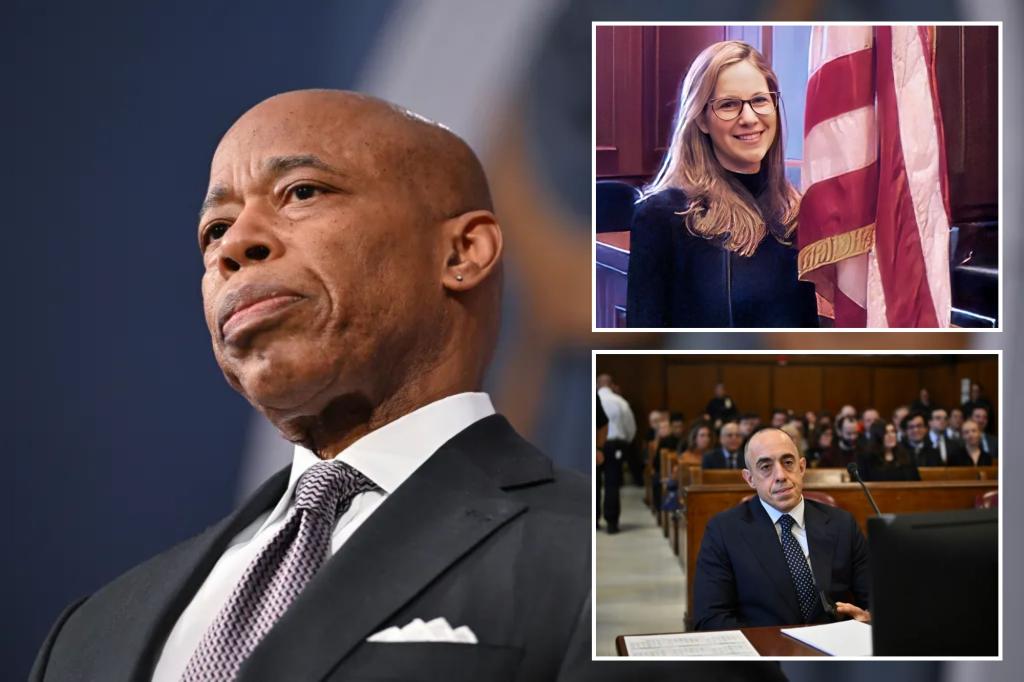World
Eric Adams was compromised by ‘politicized’ case, putting NYers at risk, DOJ officials say while accepting top prosecutor’s bombshell resignation

Political Storm Erupts: DOJ Clashes with Manhattan US Attorney over Mayor Adams’ Case
A political firestorm erupted Thursday as the Trump Justice Department lambasted Manhattan’s interim US Attorney, Danielle Sassoon, for her refusal to dismiss a corruption case against New York City Mayor Eric Adams. Sassoon’s abrupt resignation, which followed a scathing letter criticizing the DOJ’s intervention, has thrown the case into chaos and raised questions about the independence of federal prosecutors. The DOJ, under Acting Deputy Attorney General Emil Bove, accused Sassoon of overstepping her authority by challenging the department’s directive to drop the case, arguing that the prosecution was “weaponized” and interfered with Adams’ ability to govern and campaign for the 2025 election. Bove emphasized that the ongoing case endangered public safety by hindering Adams’ communication with city officials and federal agencies on critical security matters. This high-stakes showdown highlights the fragile balance between federal authority and local prosecutorial independence.
Sassoon’s Scathing Resignation Letter Exposes Deep Rift with DOJ
In a blistering resignation letter to Attorney General Pam Bondi, Sassoon accused the DOJ of attempting to orchestrate a “quid pro quo” deal with Mayor Adams. She alleged that Adams’ legal team offered to assist Trump’s immigration agenda in exchange for the dismissal of the corruption charges against him. Sassoon refused to comply with Bove’s order to dismiss the case, asserting that the indictment returned by a grand jury should not be overturned for political convenience. She also revealed that her office was prepared to file additional charges against Adams, including evidence tampering and obstructing justice. Sassoon’s resignation marked a dramatic escalation in the conflict, as she accused Bove of attempting to undermine the integrity of the judicial process. Her departure has sent shockwaves through the legal community, with many questioning the DOJ’s motives and the potential long-term consequences for prosecutorial independence.
Bove Fires Back: DOJ Prioritizes National Security Over Prosecution
Acting Deputy Attorney General Emil Bove fired back at Sassoon, defending the DOJ’s decision to drop the case against Mayor Adams. In a letter accepting Sassoon’s resignation, Bove argued that the ongoing prosecution compromised Adams’ ability to lead the city and collaborate with federal agencies on national security and crime prevention. He claimed that Adams had been denied a security clearance, limiting his access to critical information and hindering his ability to protect New York City from threats. Bove dismissed Sassoon’s concerns about political interference, stating that the DOJ’s responsibility to safeguard public safety outweighed her objections. He also criticized Sassoon for challenging the department’s authority, emphasizing that local prosecutors like herself lacked the broader perspective needed to make such judgments. Bove’s stance reflects the Trump administration’s broader effort to centralize control over federal prosecutions and align them with presidential priorities.
The Broader Implications: A Blow to Prosecutorial Independence
The clash between the DOJ and the Southern District of New York (SDNY) has significant implications for the independence of federal prosecutors. Traditionally, the SDNY has operated with a degree of autonomy, earning the nickname “the Sovereign District” for its reputation of resisting political pressure from Washington. However, Bove’s actions signal a shift in that dynamic, with the DOJ asserting its authority over local prosecutors. Sassoon’s resignation and the placement of four public corruption prosecutors on administrative leave underscore the growing tension between the Trump administration and the judiciary. Legal experts warn that this could set a dangerous precedent, eroding public trust in the fairness of federal investigations and prosecutions. The controversy also raises questions about the role of prosecutors in balancing political pressures with their duty to uphold the law.
A Legal and Ethical Quagmire: Quid Pro Quo Allegations and the Future of the Case
At the heart of the controversy are allegations of a quid pro quo arrangement between the Trump DOJ and Mayor Adams. Sassoon accused Adams’ legal team of offering to support Trump’s immigration agenda in exchange for the dismissal of the corruption charges. She likened this to the controversial prisoner swap involving Russian arms dealer Victor Bout, a comparison that drew sharp criticism from Bove. Adams’ defense attorney, Alex Spiro, denied the allegations, calling them a “total lie” and arguing that the prosecution lacked sufficient evidence to proceed. Despite these denials, the optics of the situation are deeply troubling, with many critics accusing the Trump administration of using the DOJ as a political tool to shield its allies. The ethical implications of such actions could have far-reaching consequences for the integrity of the justice system.
Fallout and Future: What’s Next for the Adams Case and the SDNY?
As the dust settles on Sassoon’s resignation, the future of the case against Mayor Adams remains uncertain. The SDNY, now under the leadership of veteran prosecutor Matthew Podolsky, faces intense pressure from the DOJ to dismiss the charges. While Sassoon’s departure has removed a key obstacle to the DOJ’s agenda, her exit has also galvanized opposition within the legal community. Sources indicate that more prosecutors may resign if the DOJ continues to push for the case to be dropped. Meanwhile, Adams has attempted to capitalize on the situation, aligning himself with Trump’s immigration policies and promising to allow ICE agents to return to Rikers Island. The next steps in the case will be closely watched, with many bracing for a prolonged legal battle. For now, the clash between the Trump DOJ and the SDNY serves as a stark reminder of the challenges of maintaining judicial independence in an increasingly polarized political landscape.